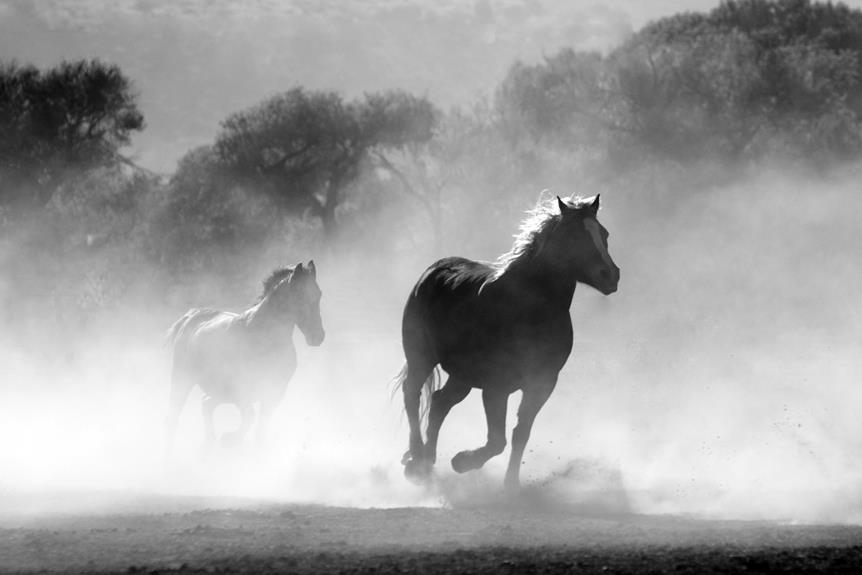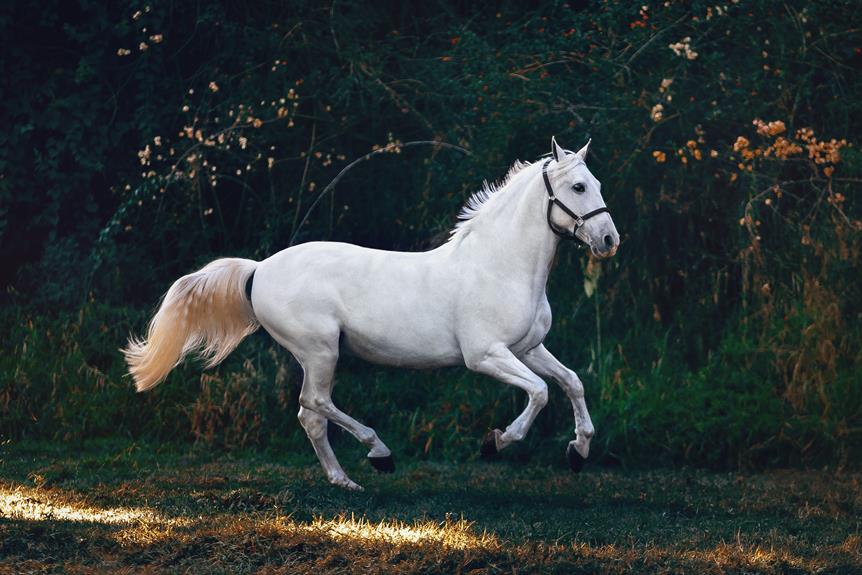As you stand near the stable, the air heavy with the scent of hay and manure, you can't help but wonder: what smells do horses despise? Horses, with their acute sense of smell, are known to have preferences when it comes to certain scents.
From the tangy aroma of citrus to the pungent whiff of vinegar, there are some odors that horses just can't stand. But what makes these scents so repulsive to our equine friends? And how can we utilize this knowledge to our advantage?
In this discussion, we will explore the smells that horses hate and unravel the mysteries behind their olfactory aversions.
Key Takeaways
- Citrus scents, such as lemon, orange, and grapefruit, are unpleasant to horses and can be used as repellents.
- Vinegar can be used as a natural repellent for horses and can be easily made by mixing equal parts vinegar and water.
- Garlic and onions have strong odors that horses dislike and can be used in sprays or as a barrier.
- Ammonia, although effective at deterring horses, should be used with caution and natural alternatives like citronella or peppermint are recommended.
Citrus Scents
Citrus scents are detested by horses due to their strong and sharp aroma, which deters them from approaching certain areas or plants. Horses have a keen sense of smell, and they find the scent of citrus fruits like lemon, orange, and grapefruit to be unpleasant. This aversion to citrus scents isn't a false claim but a well-documented fact among horse owners and trainers.
The strong and sharp aroma of citrus scents is believed to be the reason why horses dislike them. This powerful smell can be overwhelming for horses, causing them to avoid areas or plants that have been infused with citrus scents. This natural reaction is beneficial in preventing horses from damaging certain plants or areas.
In fact, citrus-scented repellents can be used as a non-toxic method to repel horses from specific areas, such as Arecas. Essential oils derived from citrus fruits can be used to create sprays or diffusers that discourage horses from nibbling on plants like Arecas. By using citrus-scented repellents, horse owners and gardeners can protect their plants from being damaged and maintain their overall health.
Vinegar
One versatile household item that can be used for various purposes, including as a natural repellent, is vinegar. When it comes to deterring horses, vinegar can be an effective and eco-friendly option. The benefits of using vinegar as a horse repellent are numerous. Not only is it non-toxic and safe for the environment, but it also emits a strong odor that horses find unpleasant, keeping them away from areas where it's applied.
To effectively use vinegar as a horse repellent, you can dilute it with water and spray it around plants or areas where horses aren't wanted. This homemade vinegar horse repellent can be easily made by mixing equal parts vinegar and water in a spray bottle. It's important to reapply the solution regularly, especially after rain or when the smell starts to fade.
In addition to repelling horses, vinegar has many other household uses. It can be used as a natural weed killer, pet stain remover, and to eliminate odors in the home. By incorporating vinegar into your daily routine, you can enjoy its versatility and eco-friendly benefits while keeping horses away from unwanted areas.
Garlic and Onions
To repel horses, garlic and onions can be used due to their strong odors that horses dislike. These natural repellents have been found to be effective in deterring horses from specific areas. The pungent smell of garlic and onions comes from compounds such as allicin and sulfides, which contribute to their repellent properties.
When used in sprays or mixed with other ingredients, garlic and onions can create a barrier that horses find unpleasant. However, it's crucial to use these repellents in a way that's safe for both the horses and the plants they're meant to protect. Care should be taken to avoid direct contact with the horse's skin or eyes, as these strong odors can cause irritation. Additionally, it's important to follow the recommended dosage and application instructions to ensure safe usage.
Ammonia
The pungent smell of garlic and onions may be effective in repelling horses, but another strong-smelling chemical compound that can also deter them is ammonia. Ammonia is composed of nitrogen and hydrogen and is known for its sharp and irritating odor that horses find highly unpleasant. Horses have a keen sense of smell and can be sensitive to the presence of ammonia. This strong smell can effectively repel horses and prevent them from approaching certain areas or objects.
However, it's essential to consider horse health and safety when using ammonia as a repellent. Proper ventilation is crucial to prevent the accumulation of ammonia fumes in enclosed spaces, as high levels of ammonia can be harmful to horses. Direct contact with ammonia should also be avoided, as it can cause skin and eye irritation.
If you're looking for alternatives to ammonia, there are other horse-friendly options available. Natural repellents such as citronella or peppermint can be used to create a pleasant scent that horses find more appealing. Additionally, maintaining a clean and well-ventilated environment can help reduce the presence of ammonia and keep horses comfortable.
To use ammonia safely, it's important to follow best practices. Use it in well-ventilated areas, and wear appropriate protective gear such as gloves and goggles. Regularly monitor ammonia levels and take steps to reduce its concentration if necessary.
Strong Perfumes
Strong perfumes can be overwhelming for horses and may cause them to become agitated or stressed. Horses have a highly sensitive sense of smell, and strong perfumes can be particularly off-putting for them. The strong scents in perfumes can interfere with a horse's ability to pick up important environmental cues and signals. Using strong perfumes around horses can disrupt their natural behavior and may lead to discomfort or anxiety. It's important to be mindful of the scents and fragrances used around horses to ensure their well-being and comfort.
| Cologne Choices | Effect on Horses |
|---|---|
| Floral Fragrances | The strong floral scents in perfumes can overwhelm horses and cause them to feel agitated or stressed. The intense and unfamiliar smells can disrupt their natural behavior. |
| Synthetic Scents | Synthetic scents in perfumes can be particularly off-putting for horses. The artificial and chemical-like smells can be overwhelming and may interfere with their ability to pick up important environmental cues and signals. |
When choosing perfumes to wear around horses, it's best to opt for mild and subtle scents rather than strong and overpowering ones. Avoid using perfumes with strong floral fragrances or synthetic scents. Instead, opt for more natural and gentle scents that are less likely to bother horses. By being mindful of the scents you wear around horses, you can help create a more comfortable and stress-free environment for them.
Frequently Asked Questions
What Smells Scare Horses?
Certain essential oils like lavender and citrus can repel horses. Cleaning products with strong scents or chemicals may agitate them. Strong perfumes and colognes can affect horse behavior negatively.
What Do Horses Hate the Most?
Horses hate the smell of certain things. Their behavior and sensory preferences make them naturally averse to certain scents. Understanding their aversions can help you manage their reactions and keep them comfortable.
What Tastes Do Horses Hate?
Horses hate bitter and sour flavors, which can cause taste aversion. These tastes discourage them from consuming certain foods or plants. Avoid feeding them anything with these flavors to keep them happy and healthy.
Do Horses Hate the Smell of Blood?
Horses don't hate the smell of blood, but they can sense fear or nervousness. Instead, they dislike strong smells like vinegar, smoke, and citrus. Stay calm and confident around horses to create a positive environment.
Conclusion
In conclusion, horses have a strong aversion to certain smells such as citrus, vinegar, garlic and onions, ammonia, and strong perfumes. These scents can be used as natural repellents to keep horses away from specific areas or objects.
However, it's important to remember that individual preferences may vary, so it may be necessary to experiment with different smells to find what works best for each horse.



0 Comments